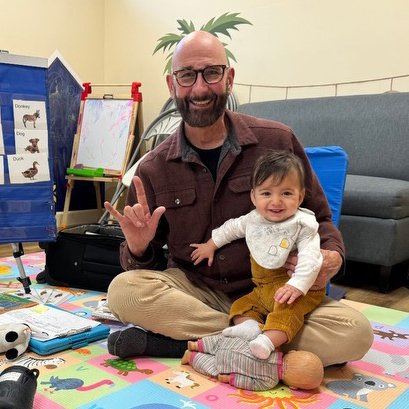Baby Sign Language
Intro to Baby Sign Language Workshop
Monday, February 23, 12:00-1:30pm
Tuesday, April 14, 12:00-1:30pm
Tuesday, June 2, 12:00-1:30pm
Fee: $59 per person, additional family members can join for just $20.*
Baby Sign Language Series
Tuesdays 12:00-1:00pm
January 20-February 24 (YELLOW series)
March 3-April 7 (BLUE series)
April 21-May 26 (RED series)
Fee: $169 per person, additional family members can join for just $50.*
Note: The Intro workshop is NOT a prerequisite to the series and you can start with ANY SERIES color.
Teacher: Bill White, author of Signs of a Happy Baby
*To register additional family members, please purchase a package here before registering.
"Family member" in this case refers to another adult who is signing with one baby, for example two parents, or a parent and grandparent, or a parent and caregiver. Siblings or cousins or friends taking the class together to sign with their own respective babies are NOT considered family members in this case.
Sign Language gives babies the opportunity to communicate long before they can verbalize their wants and needs.
Research studies show that signing with babies accelerates language acquisition, reduces frustration, enhances a child's self-esteem, and deepens the bond between parent and child. (For more details on the benefits of signing with your baby, see below).
Intro to Baby Sign Language: Our 90-minute workshop introduces more than 20 signs that are based on American Sign Language (ASL). It is designed for expectant parents and parents with babies ranging in age from birth to 18 months. You will learn about the latest research and all the tools to teach your baby to sign. Fun activities and songs will show you how easy it can be to integrate simple signs into your everyday routine to jump-start your child’s verbal skills. Families often follow this Introductory Workshop with a 6-week series to perfect their skills and grow their vocabulary.
Baby Sign Language Series: Our 6-week series is a fun way to build your signing vocabulary and skills with themes like mealtime, animals, colors, family, bedtime, and more. Eighteen sessions are split into three different six-day series named after the primary colors: Red, Yellow, and Blue. No need to take them in order. Just dive into one. Each series includes the essential basic starter signs and vary in the more advanced vocabulary. The Introductory Workshop is recommended but is not a prerequisite. Older siblings are welcome to join the fun and ask questions too!
Benefits of Signing with Your Baby
Accelerates language acquisition. Research studies have found that signing babies normally begin to speak earlier and have larger vocabularies than non-signing babies.
Provides a parent the opportunity to develop a window into their child's mind. By including signs in daily activities, parents spend less time guessing what children want and more time fulfilling their specific needs.
Teaches a simple language that allows babies to easily express their immediate desires and needs, significantly lowering frustration levels for everyone.
Allows babies to lead the conversation about topics that interest them. When a parent then verbalizes the sign, it fortifies a baby’s expanding vocabulary.
Utilizes more diverse areas of the brain for communication. Rather than language being processed solely through auditory pathways, signing adds visual and kinesthetic emphasis to a child’s auditory input.
Gives babies a sense of control when they know that those around them not only hear them but understand them. This greatly enhances a child’s self esteem and emotional stability.
Helps parents and health care providers localize pain and identify medical conditions.
Enables children to express their fears or concerns.
Decreases aggressive behavior such as biting, hitting, and excessive noise in preschool and elementary school programs.
Increases a child’s interest in reading.
Builds an iconic bridge between two languages in a bilingual family. For example, the same signs can be used for words spoken in English or Spanish. Knowing a sign for a word helps a child recognize the same word spoken in other languages.
May actually improve a child's IQ. Research studies have followed signing babies as they mature. At eight years old, these children scored, on average, 12 points higher in IQ testing than a control group of non-signing eight year olds. The signers had a mean IQ of 114 (75th percentile) versus the non-signers’ mean score of 102 (53rd percentile). The study was designed to equalize socioeconomic factors between the two groups.


